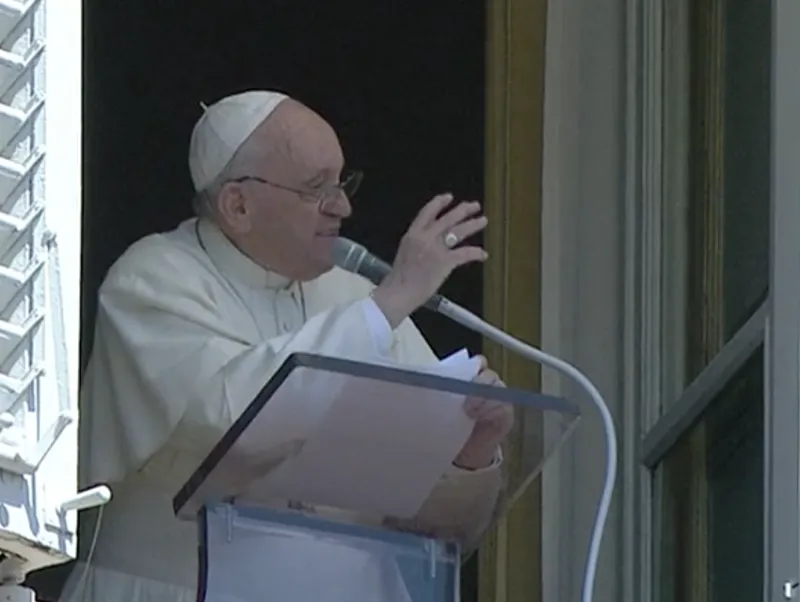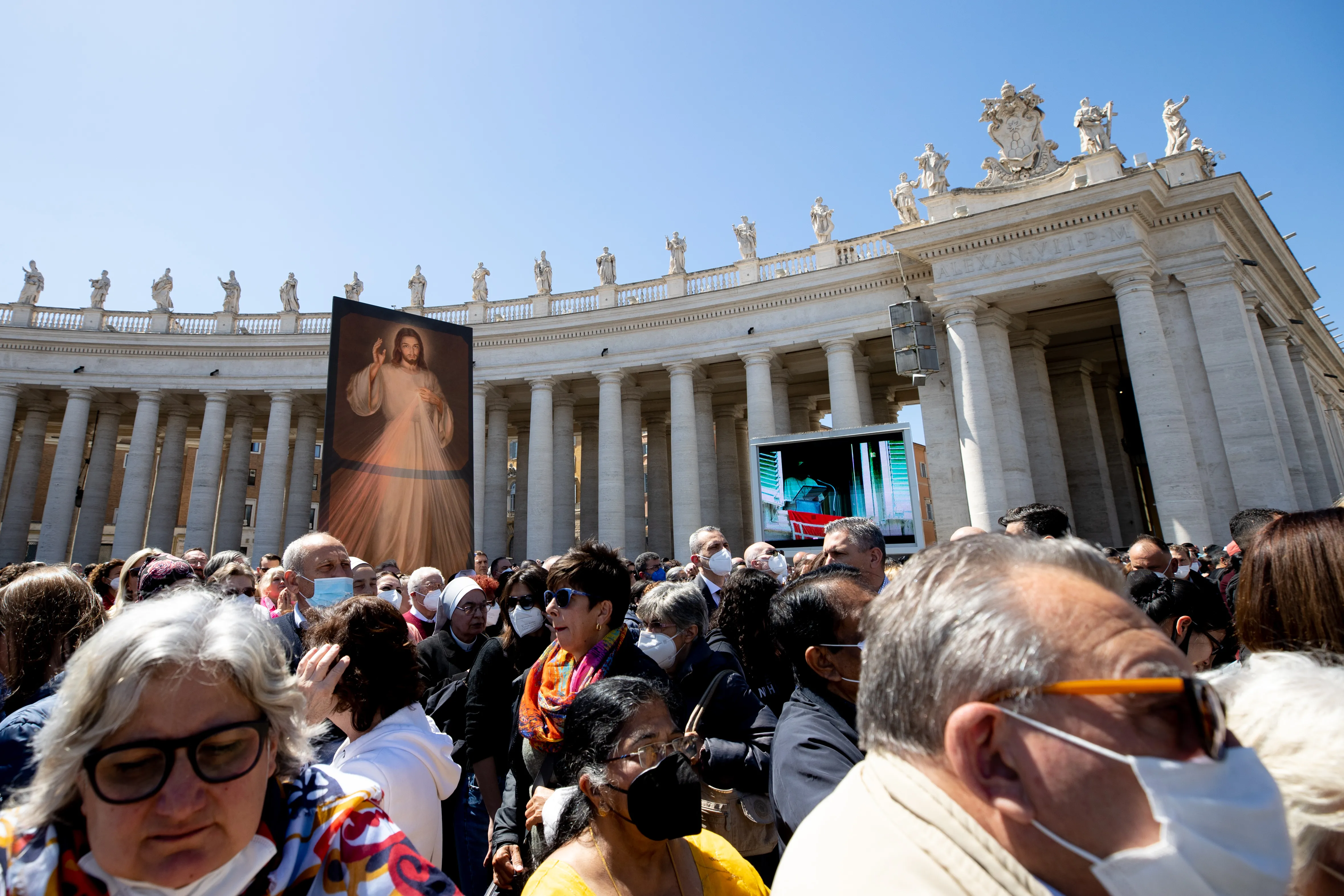
Washington, D.C. Newsroom, Apr 24, 2022 / 07:06 am (CNA).
Jesus’ merciful words to a doubting St. Thomas reminds us that the Lord does not expect us to be “perfect Christians,” Pope Francis said Sunday.
Instead, Jesus wants us “to seek him, to call on him, or even, like Thomas, to protest, bringing him our needs and our unbelief,” the pope said.
In his reflections prior to the recitation of the Regina Caeli, Pope Francis spoke to a large crowd gathered in St. Peter’s Square on Divine Mercy Sunday about the gospel account of Jesus’ encounter with Thomas in the Upper Room.
Thomas, who was not present the first time the resurrected Jesus appeared to the apostles, “represents all of us,” the pope said.
“We too struggle at times like that disciple: How can we believe that Jesus is risen, that he accompanies us and is the Lord of our life without having seen him, without having touched him?
“How can one believe in this? Why does the Lord not give us some clearer sign of his presence and love? Some sign that I can see better,” Pope Francis said.
“Here, we too are like Thomas, with the same doubts, the same reasoning,” he continued.
“But we do not need to be ashamed of this. By telling us the story of Thomas, in fact, the Gospel tells us that the Lord is not looking for perfect Christians. The Lord is not looking for perfect Christians.”

The pope went on to speak in strong terms against an attitude of righteousness and self-assurance.
“I tell you: I am afraid when I see a Christian, some associations of Christians who believe themselves to be perfect. The Lord is not looking for perfect Christians; the Lord is not looking for Christians who never doubt and always flaunt a steadfast faith. When a Christian is like that, something isn’t right,” the pope observed.
“No, the adventure of faith, as for Thomas, consists of lights and shadows. Otherwise, what kind of faith would that be? It knows times of comfort, zeal and enthusiasm, but also of weariness, confusion, doubt, and darkness.
“The Gospel shows us Thomas’ ‘crisis’ to tell us that we should not fear the crises of life and faith,” Pope Francis continued. “Crises are not sins, they are part of the journey, we should not fear them. Many times, they make us humble because they strip us of the idea that we are fine, that we are better than others. Crises help us to recognize that we are needy: they rekindle the need for God and thus enable us to return to the Lord, to touch his wounds, to experience his love anew as if it were the first time.”
The pope said: “Dear brothers and sisters, it is better to have an imperfect but humble faith that always returns to Jesus, than a strong but presumptuous faith that makes us proud and arrogant. Woe to those, woe to them!”
Pope Francis went on to highlight the fact that, after appearing to the apostles while Thomas was not present, he returns a second time.
“Jesus does not give up, he does not get tired of us, he is not afraid of our crises, our weaknesses. He always comes back: When the doors are closed, he comes back; when we are in doubt, he comes back; when, like Thomas, we need to encounter him and to touch him up close, he comes back,” the pope said.
“Jesus always comes back, he always knocks on the door, and he does not come back with powerful signs that would make us feel small and inadequate, even ashamed, but with his wounds; he comes back showing us his wounds, signs of his love that has espoused our frailties,” the pope said.
“Jesus is the Lord of ‘other chances’: He always gives us another one, always. So let us think about the last time — let’s try to remember a little — that, during a difficult moment or a period of crisis, we closed in on ourselves, barricading ourselves in our problems and shutting Jesus out of the house.
“And let us promise ourselves, the next time, in our fatigue, to seek Jesus, to return to him, to his forgiveness — he always forgives, always! — to return to those wounds that have healed us,” Pope Francis said.
“In this way,” the pope urged, “we will also become capable of compassion, of approaching the wounds of others without inflexibility and without prejudice.”
In comments after his reflections, Pope Francis noted that Sunday marked two months since the start of the war in Ukraine, which began with Russia’s invasion of the country on Feb. 24.
“Today various Eastern Churches, Catholic and Orthodox, and several Latin communities, celebrate Easter according to the Julian calendar. We celebrated it last Sunday, following the Gregorian calendar. I offer them my warmest wishes: Christ is risen, he is truly risen! May he fill with hope the good expectations of hearts. May he grant peace, outraged by the barbarity of war,” the pope said.
“Today marks two months since the beginning of this war: Instead of stopping, the war has worsened. It is sad that in these days, which are the holiest and most solemn for all Christians, the deadly roar of weapons is heard rather than the sound of bells announcing the Resurrection; and it is sad that weapons are increasingly taking the place of words,” he continued.
“I renew my appeal for an Easter truce, a minimal and tangible sign of a desire for peace. The attack must be stopped, to respond to the suffering of the exhausted population; it must stop, in obedience to the words of the Risen Lord, who on Easter Day repeats to his disciples: ‘Peace be with you! (Lk 24:36; Jn 20:19.21),” the pope said.
“I ask everyone to increase prayer for peace and to have the courage to say, to show that peace is possible,” he concluded. “Political leaders, please, listen to the voice of the people, who want peace, not an escalation of the conflict.”
If you value the news and views Catholic World Report provides, please consider donating to support our efforts. Your contribution will help us continue to make CWR available to all readers worldwide for free, without a subscription. Thank you for your generosity!
Click here for more information on donating to CWR. Click here to sign up for our newsletter.






Very fine reflections for all of us to consider and follow. But, then, this: “I tell you: I am afraid when I see a Christian, some associations of Christians who believe themselves to be perfect.”
And who might these unnamed “associations” be, we feel invited to wonder? (One hopes, again, that this incongruous calumny against whomever comes from an unwelcome ghost writer.)
Perhaps the target is those who propose that the Church should find some way to embrace each person, while still not appearing (or worse) to endorse the homosexual lifestyle. Namely, all those mouthpieces of the LGBTQ “community” (association!) steering the German synodal way and much else in the Church. What has this minimal expectation against scandal, double-speak, and acquiescence have to do with any presumed personal perfection?
Also, this in the words of Christ, “Be perfect as your heavenly Father is perfect” (Mt 5:48). So, in cooperation with divine grace, something to shoot for, or at least something not to shoot down. And, yes, following Pope Francis, always with the Divine Mercy there to catch every one of us.
The Lord and Peter sometimes spoke of fear. Perhaps Francis could seek assistance from some scripture verse:
There is no fear in love. But perfect love drives out fear, because fear involves punishment, so the one who is afraid is not perfected in love…(1 John 4:18)
Bold and self-willed, they are unafraid to slander glorious beings. Yet not even angels, though greater in strength and power, dare to bring such slanderous charges against them before the Lord. These men are like irrational animals, creatures of instinct, born to be captured and destroyed. They blaspheme in matters they do not understand, and like such creatures, they too will be destroyed.… (2 Peter 2:10-11)
I’ll show you the one you should be afraid of. Be afraid of the one who has the authority to throw you into hell after killing you. Yes, I tell you, be afraid of him! (Luke 12:5)
“[P]resumptuous faith that makes us proud and arrogant”, “without inflexibility and without prejudice”, “associations of Christians who believe themselves to be perfect” – yep, sounds like rigidity to me.
This is getting beyond tiresome. And detracts from otherwise valid (though rambling) points.
Thomas had doubts but they disappeared when he had this personal encounter with our Lord. Commenting on faith, Pope Francis said: “It knows times of comfort, zeal and enthusiasm, but also of weariness, confusion, doubt, and darkness.”
How true. Any honest person would agree with that. However, some of us will only see how bad the other is. Jesus warned against this attitude: “You hypocrite! First take the beam out of your own eye, and then you will see clearly to remove the speck from your brother’s eye.” Clearly Jesus is telling us that we all have our imperfections.
Doubt no longer but believe (Jn 20:26). Jesus commands Thomas prior to Thomas’ exclamation of faith. That speaks to the significance of the coercive nature of faith, which Courtney Murray SJ egregiously neglects in Dignitatis Humanae, as such, contributing to the relativism that infects Catholicism to this day as is evident in the thought of our Supreme Pontiff. At the Ascension, “Proclaim the Gospel to all nations. He who refuses to believe will be condemned” (Mk 16:16).
Belief in Christ is to acknowledge the irrefutable good that is the Father. This conscientious belief emerges from within the soul of man, a spirit created in God’s image, equipped precisely to apprehend the supreme good that is God.
“Christians who believe themselves to be perfect”, who His Holiness admonishes, those who claim to have all the answers as he’s wont to say are the conceptualizations of, ironically that same intellectual relativism that drives the German Synodalerwege and which the Pontiff admonishes in his letter to them.
I wonder what Pope Francis thinks Jesus meant when he said this: “You, therefore, must be perfect, as your heavenly Father is perfect.” (Matt 5:48)
Thanks Mike…you beat me to it!
As to the Pontiff, that doesn’t count, because as his spokesman says, the Pontiff doesn’t have the typical “attachments” other Popes have to scripture and tradition.